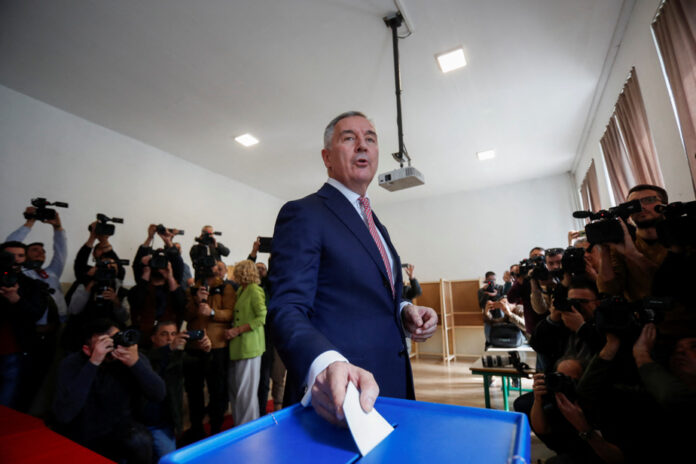(Podgorica) Montenegro’s incumbent President Milo Djukanovic will face young pro-European economist Jakov Milatovic in the second round of the presidential election, according to an exit poll released Sunday evening after the first round of voting.
Milo Djukanovic is credited with 35% of the vote against 29% for Jakov Milatovic, according to this poll carried out by the NGO CeMI, responsible for observing the conduct of the election.
The Electoral Commission is expected to release the preliminary official results on Monday. The second round of voting will take place on April 2.
This election is being played out after months of deadlock in the country bordering the Adriatic. Two governments have been overthrown by a motion of no confidence since the 2020 legislative elections, the last time in August, and the cabinet in place manages day-to-day business.
Incumbent President Milo Djukanovic dissolved parliament a few days before the presidential polls and called early parliamentary elections for June 11.
Montenegro, which is negotiating its entry into the European Union, “is completely paralyzed on its European path”, declared the head of state on Friday, announcing the date of the legislative elections.
In this country of 620,000 inhabitants, the president essentially has a representative role and the prime minister holds the main levers of power.
Milo Djukanovic, 61, nevertheless remains an important figure, he who has ruled Montenegro almost continuously for three decades, as president or prime minister. A former close friend of Belgrade strongman Slobodan Milosevic, he rallied to the Western camp and secured his country’s divorce from Serbia in 2006.
His opponent, if the poll result were to be confirmed, is 37 years old. Jakov Milatovic held the post of Minister of Economic Development in the first government formed after the 2020 elections. He then left a post at the European Bank for Reconstruction and Development (EBRD) to join the cabinet.
Described as a populist by some, he is one of the founders in 2022 of the movement Europe now, a formation which seems to have the wind in its sails.
Radovan Djedovic, a 72-year-old retiree from Podgorica, wants change: “Nowhere in the world does a man rule for more than 30 years. During this time, the United States has changed its president five or six times.”
After voting, Mr. Djukanovic urged his compatriots to seize the “opportunity” of the ballot to choose “stability” and the “goal” of a Montenegro within “the family of European states and peoples”.
“I know that all (the candidates) have the same ambition, that of defeating the current president […] and I am certain of my superiority,” he added.
But his star faded during the 2020 legislative elections. His formation, the Democratic Party of Socialists (DPS), was beaten there by a coalition supported by the powerful Serbian Orthodox Church, the main religion in the country.
However, no camp has managed to build a stable majority since then and the country is going from crisis to crisis.
Milatovic called on voters to put an end to “the politics of the past.” “I entered the presidential race to defeat Milo Djukanovic, and not only Mr. Djukanovic, but everything he represents in Montenegro […] He symbolizes the past, the policies that divided this country, the policies that impoverished this country he said after casting his vote.
Under the incumbent president, Montenegro joined NATO in 2017, has been negotiating EU membership since 2012, and exited Russia’s sphere of influence.
But the rule of Milo Djukanovic and the DPS has been marred by accusations of widespread corruption and connections to organized crime.
Many residents are without illusions. “I am disappointed with the government which promised reforms and rapid entry into the EU,” Anja, a 32-year-old lawyer, told AFP who requested anonymity.


















